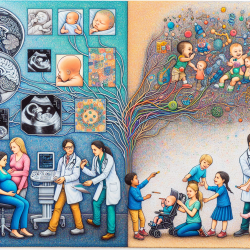The intricate dance between genetics and speech production has long intrigued scientists and practitioners alike. The recent study titled "The Association Between Genetic Variation in FOXP2 and Sensorimotor Control of Speech Production" sheds light on how variations in the FOXP2 gene can influence speech motor behavior. This knowledge is crucial for practitioners aiming to refine their therapeutic approaches and for researchers looking to delve deeper into the genetic underpinnings of speech.
The FOXP2 Gene: A Brief Overview
FOXP2 is a gene associated with speech and language disorders. Mutations in this gene have been linked to conditions like developmental verbal dyspraxia, characterized by difficulties in planning and coordinating the movements required for speech. The study focuses on a common variant of this gene, rs6980093, examining its impact on sensorimotor integration during speech production.
Key Findings from the Study
The research highlights several significant findings:
- Genotype Influence: Individuals with the GG genotype exhibited smaller vocal compensations for -200 cents pitch perturbations compared to those with AA or AG genotypes.
- Cortical Responses: Larger P2 responses were observed in individuals with the GG genotype, indicating increased left-lateralized brain activity in regions critical for auditory-motor integration.
- Auditory Feedback Reliance: The AA and AG genotypes showed positive correlations between vocal compensation and baseline voice variability, suggesting a greater reliance on auditory feedback.
Implications for Practitioners
These findings offer valuable insights for speech therapists and other practitioners:
- Personalized Therapy: Understanding a client's genetic predisposition can help tailor therapy strategies that align with their unique sensorimotor integration capabilities.
- Enhanced Assessment: Incorporating genetic testing into assessments could provide a more comprehensive understanding of a client's speech production challenges.
- Feedback Mechanisms: Therapists can focus on strengthening either feedback or feedforward control mechanisms based on the client's genetic profile.
The Path Forward: Encouraging Further Research
The study opens up numerous avenues for further research. Exploring how other genetic variations interact with FOXP2 could deepen our understanding of speech disorders. Additionally, investigating how environmental factors influence these genetic predispositions could lead to more effective intervention strategies.
The Association Between Genetic Variation in FOXP2 and Sensorimotor Control of Speech Production
This research not only enhances our understanding of the biological foundations of speech but also underscores the importance of integrating genetic insights into therapeutic practices. As we continue to unravel the complexities of speech production, both practitioners and researchers stand to benefit from these groundbreaking findings.










